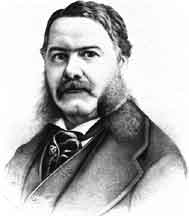|
|
|
Chester Arthur
|
 - -
|
Chester Arthur was born in North Fairfield, Vermont. His father was a preacher. During his childhood, he moved seven times. Arthur attended high school and Union College in Schenectady, and graduated Phi Beta Kappa. On graduation, he went on to study law.
Arthur practiced law in New York City. His most famous case was his suit against a Brooklyn streetcar company for forcibly ejecting a black woman, Lizzie Jennings, from a whites only street car. This case resulted in the desegregation of New York's public transportation system.
Arthur became active in New York Republican politics, and in 1867, rose to become chairperson of the Executive Committee of the State Republican Committee. During the Civil War, he served with the New York State Militia in the Union Army. He rose to become Quartermaster General of the New York troops.
In 1871, Arthur was appointed tax collector of the Port of New York. As such, he was responsible for the collection of 75% of the United States' income from tariffs. He held the post until 1878. In 1880 he was nominated for the post of Vice President as a compromise candidate to balance Garfield's ticket. He was elected with Garfield, and assumed the Presidency on Garfield's death.
Chester Arthur surprised many by his pursuit of reform. Arthur was a strong supporter of reform in the appointment of government workers. He supported the Pendelton Act that created the modern civil service. His support of the Act angered his supporters and ultimately cost him his renomination.
Arthur was also a supporter of tariff reform. He created a commission that investigated the issue of tariffs and recommended an overall tariff reduction. After extensive lobbying by all sides, a bill with many different features was passed, satisfying no one. It was called the Mongrel Tariff Act. Arthur was a supporter of the creation of a modern navy.
|
|
|
|

